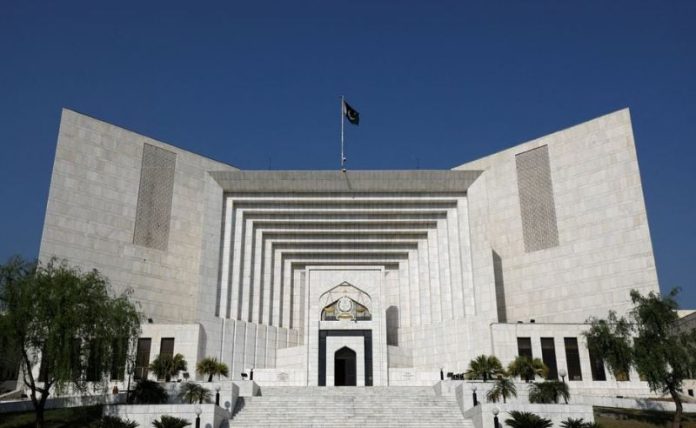ISLAMABAD, DEC 13: The Supreme Court suspended on Wednesday its October 23 unanimous decision nullifying military trials of civilians.
A six-member bench hearing the case had earlier today reserved its verdict on a set of intra-court appeals (ICAs) filed by the caretaker federal government and the provincial governments of Balochistan, Punjab and Khyber-Pakhtunkhwa. The Sindh government abstained from filing a plea.
The bench hearing the appeals today is headed by Justice Sardar Tariq Masood, and includes Justice Aminuddin Khan, Justice Muhammad Ali Mazhar, Justice Syed Hasan Azhar Rizvi, Justice Musarrat Hilali and Justice Irfan Saadat Khan.
The verdict was announced by a majority of 5:1, as Justice Musarrat Hilali objected to it.
On October 23, a five-member bench declared the military trials of individuals detained after the country’s violent protests on May 9 null and void during the hearing of multiple petitions.
As the hearing commenced today, Justice Masood refused to recuse himself from the bench over objections raised by the counsels. Advocate Latif Khosa informed Justice Masood that objections had been raised over his presence on the bench, to which he replied if his client, Aitzaz Ahsan, had been issued a notice on notice on the matter.
The apex court judge then added that arguments could be conducted if there are objections against a judge’s inclusion before a notice has been issued and referred to an earlier decision by Justice (retd) Jawad S Khwaja which stated hat it is the will of the judge to either remain or recuse himself from the bench.
Attorney General of Pakistan Mansoor Awan said that the objections raised by the parties are baseless, and urged the bench to hear the case on merit.
Khosa, however, countered that Justice Masood had given his opinion on pleas related to military courts in his earlier note. To which Justice Masood asked the counsels who had objected and was informed by Advocate Salman Akram Raja that Justice (retd) Khwaja had raised objections.
The counsels were reminded that it was Khwaja’s verdict regarding a judge recusing from the bench. “I will not recuse myself from the bench, what can you do,” said Justice Masood.
“You are hearing the case despite our objections,” replied Khosa.
The AGP again asked how could objections be heard when there has been no notice on the matter. Referring to Khwaja, he added that those “who raised the objections are themselves not present in court”.
The court then started hearing the appeals and the objecting counsels were asked to take a seat.
The defence ministry’s counsel, Khawaja Haris, then took the rostrum and argued that the SC’s earlier order dated Oct 23 did not mention which articles of the Constitution and provisions of the Army Act were declared unconstitutional.
Citing the case of Brigadier (retd) F.B Ali, he said the Army Act’s sections were upheld and a 17-member full court had also declared the judgement as correct when hearing a case on the 21st Amendment.
Haris added that the apex court had previously ruled that is a crime pertained to the military, then the trial could be held in a military court.
Justice Mazhar inquired from Haris how he would ensure that a “fair trial” was held in military courts. In response, he referred to the trial of Indian spy Kulbushan Yadav and argued that the Army Act’s jurisdiction over civilians was “already limited” and provisions related to civilians could not be declared void.
Justice Masood then observed that noted that a detailed verdict on military trials of civilians had not been issued.
When Justice Saadat asked Harif why not wait for the detailed verdict in the case, he responded that he would then request the SC to allow resumption of military trials of those already in military custody.
Khosa, objecting to a stay order on the Oct 23 verdict, said that judges who made that decision were also part of the apex court.
AGP Awan requested to court to allow conditional resumption of military trial, to which Justice Masood asked how could the court allow the action when certain sections of the Army Act had been nullified. Justice Mazhar then wondered why was there such a hurry to decide on the matter.
The court had then reserved its verdict, which was then announced after a short recess.
Following the apex court verdict, several intra-court appeals were lodged. Last week, the Supreme Court announced the formation of a six-member larger bench, led by Justice Sardar Tariq Masood, to oversee these appeals.
In their intra-court appeals, the caretaker federal government and the defence ministry urged the top court to restore the sections of the Official Secrets Act.
However, on Monday, Justice Ijazul Ahsan raised objections over benches recently formed to hear two high-profile cases.
In his letter sent to the registrar, Justice Ahsan noted that he had attended the meeting of the three-member committee held in the chamber of Chief Justice of Pakistan (CJP) Qazi Faez Isa on Thursday, December 7, with regard to the formation of benches in the two cases.
He said it was agreed in the meeting that as the bench that delivered a verdict against court-martial of civilians comprised five judges, the bench to hear appeals against the verdict should have seven judges.
Justice Ahsan stated that the CJP had agreed to his suggestion that in order to dispel the impression of “pick and choose” the bench to hear the appeals against military courts and Justice Naqvi’s petition should consist of the senior most judges of the court.
The judge stated that instead of a seven-member bench, a six-member bench was formed to hear the appeals against SC’s military court verdict and that he had not been informed if any of the judges who are higher in the order of seniority had refrained from becoming part of the bench.
Former CJP also objects to larger bench
Simultaneously, former CJP Jawwad S Khawaja has filed an application in the apex court requesting that Justice Sardar Tariq Masood recuse himself from hearing the appeal against SC order banning trial of civilians in military courts “in the interest of justice.”
The former CJP, who is one of the petitioners who challenged court-martial of the May 9 rioters, stated that Justice Masood and Justice Qazi Faez Isa were part of the nine-member bench formed by former CJP Umar Ata Bandial to hear petitions against military courts.
He highlighted that both Justice Isa and Justice Masood had refused to hear the petitions.
“Justice Isa read out a prepared note in open court. After reading out the note, Justice Isa and Justice Masood rose from the bench. The bench was thereafter reconstituted. Justice Masood issued a signed document dated 26.6.2023.”
He said the note reflects Justice Masood’s views on various matters.
“The relevance of the note for the purposes of the present application is that it gives findings in paragraph number 3 with respect to the maintainability of the subject petitions.
“As a result of these findings, Justice Masood has already expressed his view in this specific matter (and this view was expressed without hearing the parties) that the subject petitions were not maintainable under Article 184(3),” he added.
The former CJP requested the court that Justice Sardar might recuse himself from hearing the case and the matter might be referred back to the three-member committee for reconstitution of the bench.












